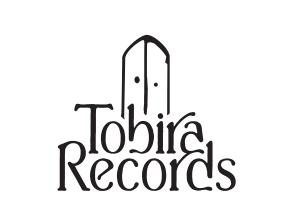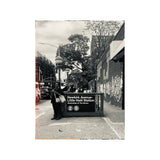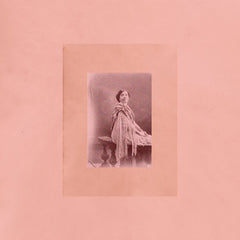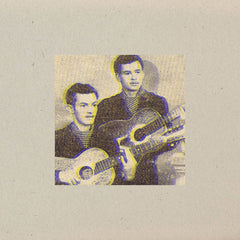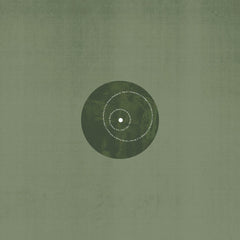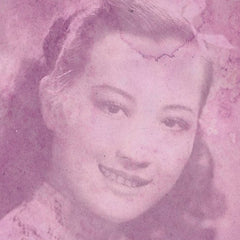Various Artists (Death Is Not The End) // "Vous Ecoutez La Voix du Peuple": The Kreyol Language Pirate Radio Stations of Flatbush, Brooklyn TAPE
- Availability:
This is a compilation tape released in June 2023 by Death Is Not The End, a label specializing in excavations in London, England.
This is a compilation of broadcasts from a Haitian pirate radio station in New York.
*If you would like a digital sound source, please feel free to contact us.
Below is a commentary by the label.
"Every day, New York's skies are filled with an invisible radio cloud that spreads over immigrant neighborhoods. This radio cloud, imbued with cultural energy, constantly shifts and transforms, following the life cycles and rhythms of the streets. It bursts with the flow of content.
In Brooklyn, signals blare from dollar vans, bakeries, churches, street corner and dinner table radios on Flatbush Avenue. By accessing analog technology that is essentially free to listeners, economically marginalized communities can avoid the license fees and data charges built into the convenience of digital life. The listeners, many of them older members of the community, extended their metal antennas and adjusted their radio positions to listen to music that mattered, a quality rarely felt in New York's legal, mostly corporate-owned media soundscape. News, trying to catch the elusive vibrations of information.
Flatbush primarily broadcasts to Haitians, Jamaicans, Trinidadians, Grenadians, and Orthodox Jews. Haitian stations are particularly active in East Flatbush, with just under a dozen stations broadcasting daily in Kreyol to the large Haitian community.
"I discovered this station when I was young. There was a station called Radio Guinea that was very popular in the late '80s and was based in Brooklyn," said the young Haitian-American, who was born in the United States. , says Joan Martinez, a former program host on an unlicensed Kreyol-language station. "Nobody knows where it was, but what I do know is that every weekend, from Friday night to Sunday night, these stations would come on and play the latest Haitian pop songs. My parents and friends were all sitting around the radio, talking loudly in the living room about politics, dancing, and singing. It was like a gathering place, and the radio guided it."
Labels and other worksplease use this form. ///Click here to see more Death Is Not The End releases available at Tobira.
----------------------
Ask us for digital files. Cassette in norelco case.
tracklist:
- Side A 23:58
- Side B 25:41
++
Text excerpt by David Goren, 2021 via the label
Originally published on the Sounding Out blog [link]
"Every day, the skies of New York City fill up with unseen clouds of radio signals spreading over immigrant neighborhoods. These culturally charged clouds of radio energy burst with a flow of content that continually shifts and transforms, following the lifecycle and rhythm of the streets.
In Brooklyn, the signals alight on Flatbush Avenue, blasting from radios in dollar vans, bakeries, churches and on street corners and kitchen tables. By accessing an analog technology that (outside of the radio itself) is essentially free for the listener, economically disadvantaged communities avoid the subscription and data fees built in to the conveniences of the digital life. Listeners, often the elders of the community, extend metal antennas and position the radios just so, trying to catch the elusive vibrations of crucial music, news and information that are rarely felt in New York City's legal and mostly corporate owned media soundscape.
In Flatbush, stations broadcast primarily to Haitians, Jamaicans, Trinidadians, Grenadians and Orthodox Jews. The Haitian stations are particularly active in East Flatbush with just under a dozen broadcasting daily in Kreyol to the large Haitian community.
“I came across it at a very young age. really popular station back in the late 80s, Radio Guinee, and it was based in Brooklyn.” says Joan Martinez, a young Haitian-American born in the US and a former program host on some of the unlicensed Kreyol language stations. “Nobody knows where it was, there are suspicions. But all I know is from Friday night all the way to Sunday night, you would just hear a series of these stations every weekend and it would be the place where you could listen to the latest in Haitian pop music, rap music. It was also the news, my parents and their friends would all sit around the radio and they would just be politicking in the living room getting really loud, you know, dancing, singing along that sort of thing. It was just like a meeting ground and the radio was guiding it.[...]"
Artist: Various
Label: Death Is Not The End
This is a compilation tape released in June 2023 by Death Is Not The End, a label specializing in excavations in London, England.
This is a compilation of broadcasts from a Haitian pirate radio station in New York.
*If you would like a digital sound source, please feel free to contact us.
Below is a commentary by the label.
"Every day, New York's skies are filled with an invisible radio cloud that spreads over immigrant neighborhoods. This radio cloud, imbued with cultural energy, constantly shifts and transforms, following the life cycles and rhythms of the streets. It bursts with the flow of content.
In Brooklyn, signals blare from dollar vans, bakeries, churches, street corner and dinner table radios on Flatbush Avenue. By accessing analog technology that is essentially free to listeners, economically marginalized communities can avoid the license fees and data charges built into the convenience of digital life. The listeners, many of them older members of the community, extended their metal antennas and adjusted their radio positions to listen to music that mattered, a quality rarely felt in New York's legal, mostly corporate-owned media soundscape. News, trying to catch the elusive vibrations of information.
Flatbush primarily broadcasts to Haitians, Jamaicans, Trinidadians, Grenadians, and Orthodox Jews. Haitian stations are particularly active in East Flatbush, with just under a dozen stations broadcasting daily in Kreyol to the large Haitian community.
"I discovered this station when I was young. There was a station called Radio Guinea that was very popular in the late '80s and was based in Brooklyn," said the young Haitian-American, who was born in the United States. , says Joan Martinez, a former program host on an unlicensed Kreyol-language station. "Nobody knows where it was, but what I do know is that every weekend, from Friday night to Sunday night, these stations would come on and play the latest Haitian pop songs. My parents and friends were all sitting around the radio, talking loudly in the living room about politics, dancing, and singing. It was like a gathering place, and the radio guided it."
Labels and other worksplease use this form. ///Click here to see more Death Is Not The End releases available at Tobira.
----------------------
Ask us for digital files. Cassette in norelco case.
tracklist:
- Side A 23:58
- Side B 25:41
++
Text excerpt by David Goren, 2021 via the label
Originally published on the Sounding Out blog [link]
"Every day, the skies of New York City fill up with unseen clouds of radio signals spreading over immigrant neighborhoods. These culturally charged clouds of radio energy burst with a flow of content that continually shifts and transforms, following the lifecycle and rhythm of the streets.
In Brooklyn, the signals alight on Flatbush Avenue, blasting from radios in dollar vans, bakeries, churches and on street corners and kitchen tables. By accessing an analog technology that (outside of the radio itself) is essentially free for the listener, economically disadvantaged communities avoid the subscription and data fees built in to the conveniences of the digital life. Listeners, often the elders of the community, extend metal antennas and position the radios just so, trying to catch the elusive vibrations of crucial music, news and information that are rarely felt in New York City's legal and mostly corporate owned media soundscape.
In Flatbush, stations broadcast primarily to Haitians, Jamaicans, Trinidadians, Grenadians and Orthodox Jews. The Haitian stations are particularly active in East Flatbush with just under a dozen broadcasting daily in Kreyol to the large Haitian community.
“I came across it at a very young age. really popular station back in the late 80s, Radio Guinee, and it was based in Brooklyn.” says Joan Martinez, a young Haitian-American born in the US and a former program host on some of the unlicensed Kreyol language stations. “Nobody knows where it was, there are suspicions. But all I know is from Friday night all the way to Sunday night, you would just hear a series of these stations every weekend and it would be the place where you could listen to the latest in Haitian pop music, rap music. It was also the news, my parents and their friends would all sit around the radio and they would just be politicking in the living room getting really loud, you know, dancing, singing along that sort of thing. It was just like a meeting ground and the radio was guiding it.[...]"
Artist: Various
Label: Death Is Not The End
